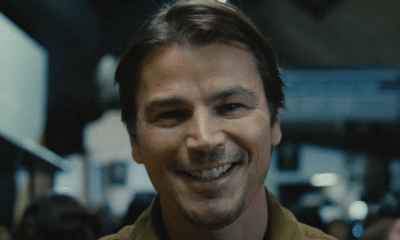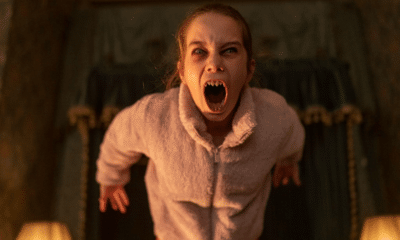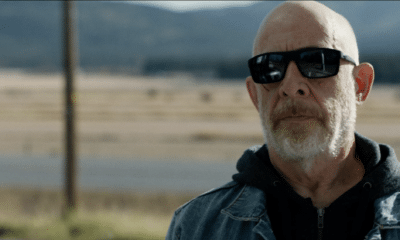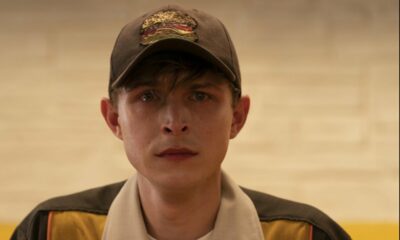
Suffragett
Carey Mulligan is consistently acknowledged as one of the finest actresses of her generation. She had already made a powerful impression on stage (in London when she was just 21, as Nina in Chekhov’s The Seagull, a role she reprised on Broadway) and on television (Bleak House, Northanger Abbey and the memorable Dr. Who episode “Blink”) before her breakout film performance in Lone Sherfig’s An Education, for which she was nominated for the Golden Globe, SAG, and Academy Award, and won the BAFTA Award for Best Actress. Since then she has shone in such wide-ranging roles as warm, vulnerable Irene in Nicholas Winding Refn’s Drive, Michael Fassbender’s troubled sister in Steve McQueen’s Shame and a furious folk singer in the Coen Brothers’ Inside Llewyn Davis. And she has not forsaken theatre, having returned to the West End last year and subsequently onto Broadway in the critically-acclaimed revival of David Hare’s Skylight opposite Bill Nighy.
After playing F. Scott Fitzgerald’s elusive dream girl Daisy Buchanan in Baz Luhrmann’s madcap adaptation of The Great Gatsby and as a modern heroine of the 19th century, Bathsheba Everdine, in Thomas Vinterberg’s romantic adaptation of the Thomas Hardy classic Far From The Madding Crowd, Mulligan wasn’t seeking an immediate return to period costume drama. But Abi Morgan’s screenplay for Suffragette and meeting director Sarah Gavron and producer Faye Ward proved irresistibly intriguing.
I imagine you weren’t thinking “I must do another period film!” so what particularly attracted you to Suffragette and what interested you in playing Maud?
You’re right. I wasn’t setting out to do a costume drama. It was really that I’d had no real understanding of what these women went through. I thought that I did, and that I knew basically what the suffragette movement was, but I was completely wrong. I discovered so much just by reading Abi Morgan’s script and spending a little bit of time with Sarah Gavron, and was so excited by the idea of telling this story to an audience who didn’t really know about it. That was it really. It was the idea that this massive moment happened in our history and our human rights history in Britain, and we’d never really talked about it or had a film about it. A large swathe of the population had no idea. So I thought what an extraordinary opportunity to be a part of such an historic film. And also what an amazing team to work with, with these women.
Maud really serves as our Everywoman, doesn’t she? Instead of a famous, iconic figure we see through an ordinary woman what the struggle was all about.
Exactly. We have so much written by the middle and upper classes in that time and so little written by the working classes, and such a limited idea of what their lives were like and how they were affected by the suffragette movement. And obviously they suffered far greater than the upper class women of that time. There was a struggle throughout the suffragette movement, but the working class women definitely had much more to lose in terms of their relationships and their work, their social standing and even their relationship to their children. So to look at it through the eyes of a very ordinary woman — and a woman who starts the film completely not interested in politics and not interested in the suffrage movement — a very conventional Victorian woman, for her to become radical was really exciting.

It’s a very brave leap a woman like that would have had to make because the women with privilege and money could be a bit more independent but a woman like Maud would have been raised to think she had her place and she had to stay in it.
Absolutely. And reputation was everything. Reputation to the working classes was the difference between life and death. To keep yourself respectable was a huge part of your life and your upbringing. It was widely accepted at that time that the man should be in charge of the household and had a higher social status than a woman and should be obeyed and respected. The idea of having equality with a woman was relatively very new. And a lot of women just completely disagreed with that idea.
What kind of research did you do?
We actually did a lot together as a cast. Faye (producer Faye Ward) and Sarah had done a huge amount because they’d been working on the film for such a long time. So we had a great deal of different materials in our rehearsal room that we could take home, like prison diaries, first-hand accounts of women who’d been arrested, letters from prison, speeches by Emmeline Pankhurst. I found a really great book written by a woman called Hannah Mitchell. I was trying to find something written by a working class woman because so much of the literature was written by women who had a full education. A lot of it was written by upper class women. But I wanted something from a working class woman’s point of view so that I could understand what Maud would have been going through and how she viewed the whole movement. And I found this book called The Hard Way Up by Hannah Mitchell. That was an account of a woman who was born into a really poor family and didn’t have anything growing up, didn’t have much of an education. She gets married. Then she starts meeting these women and becomes interested in the suffragette movement and finds this sisterhood. And it ruins her marriage. It was almost a perfect mirror of the journey that my character goes through. So that became completely invaluable and a resource that we all used a lot on set. It was amazing because this political awakening that she was having was exactly the same as the journey that Maud makes.
Moving between theatre, film, different periods, very different characters, do you have a method or approach that’s constant, that gave you a key into inhabiting Maud?
It varies from job to job, depending on the project. Oftentimes it’s a lot of reading around, it’s a lot of trying to find somebody else’s words to accompany the work. So I felt with Maud that Hannah Mitchell’s words became an accompaniment to the script, and a lot of the thoughts that Hannah Mitchell had became Maud’s thoughts. And that was the case with a lot of Suffragette. There was a lot of writing that I found around the script that I had in the back of my mind that became partly Maud’s view as well. It was also a lot about understanding what kind of life she had, the hours they used to work in the laundry and the conditions that they worked in, how much they were paid and what the pay disparity was between men and women, and what was expected of them in the household. So it was a lot of reading about that time. And talking to people. We had a great guy come in who had been on hunger strike and had been force fed, and he described what it was like, how it affected his body and what it felt like in the moment. It was pretty hard to hear but really useful in terms of making sure that we portrayed that in an authentic way. That always had to feel very real.

The force feeding was horrific to watch, and I imagine horrible to enact?
It was pretty unpleasant. Sarah and Faye had a stroke of genius, though, because they hired stuntmen and stuntwomen to play the nurses and guards around me, so that I could really thrash out, try to escape and put up as much of a fight as I wanted to without hurting anyone. Their concern was that if they hired regular actors to play those parts and I kicked out or twisted my head in the wrong way I could really hurt myself or hurt them. It was brilliant because I could literally kick and thrash and they made sure that I didn’t do myself any damage and I couldn’t hurt them, and it gave it that kind of desperation that we really needed. To have faked all that stuff would have been really difficult. The only thing that was fake was that the pipes didn’t go very far down my nose! I put up as much of a fight as I could.
There are also the protest scenes with the police wading in and the women being abused. Did it take a long time to get those scenes right?
Yes, there was a fair amount of choreography, and they were all stuntmen as well. We had to figure out how to be held and how to fight. There are some amazing shots, one where the camera was underneath me and I was picked up by two men so the camera is following me underneath being carried upside down, and all manner of crazy arrests. All the riot stuff took a long time and had to be quite carefully done because you couldn’t have let a bunch of people go completely nuts.
The laundry set is very daunting. Was it as miserable in there as it looks on the screen?
It really was! It was the most amazing set build I’ve ever been to because it was just an empty warehouse and they completely decked it out. It was was full of steam and smoke and that was the first thing we shot, the laundry scene. It was hot, damp and wet and we were sweating, so it was a great environment for us to start because it really felt like we were straight in that world. It really did feel very oppressive.
What was the experience like generally? What kind of environment did Sarah Gavron create?
It was a really amazing, collaborative, easy-going set. It definitely felt like the most buzz I’ve felt on a film set, in terms of people, the cast and the crew, having a real excitement for the story that we were telling. I think everyone felt it particularly on days when we were shooting at the Houses of Parliament or when we were recreating the death of Emily Wilding Davison, these historic moments, everyone was very excited. Sarah has complete calm around her. She exudes calm and confidence and intelligence. And she’s very open to lots of things. I came to her constantly, we all did, with ideas and different things that we’d read that we thought had to be in the film. About four weeks into filming I found a piece by Olive Schreiner called Dreams In A Desert which is the voiceover that my character reads at the end of the film, talking about hearing the feet of other women behind. Sarah loved it and then we found a way of getting that passage into the film. So everything was an ongoing conversation, nothing was finite. It all felt very free. But somehow we still managed to make the film on time, which was amazing because we only had eight to nine weeks to shoot the whole thing!

And it’s a big picture, which goes from small intimate scenes to huge set pieces.
Yes, and it all feels the same. It doesn’t feel like you’re in different films that go from real character-based scenes to the big riots and big speeches. It’s focused on performance because Sarah is about the actors but she somehow wrangles the cinematic elements. Eduard Grau our cinematographer was brilliant and very fluid with us. Any scene where Maud was on her own they would just roll the camera and I would do what I wanted to do and Eddie would light everything and just follow me wherever I would go. So I was never restricted by the filming and I never had to stay on a mark or block a scene. It was all where we went the camera went, and you can really feel that in the film.
Have you found that women filmmakers have a different energy or is it really all the same?
The women that I’ve worked with — Lone Sherfig, Susanna White, and now Sarah — have definitely had a similar calm and thoughtfulness. I mean I’ve worked with male directors who’ve been like that as well, but there’s no denying that on our set for Suffragette having the number of women that we had added something to the film and also meant that there was no real hierarchy or ego flying around in the way that I do think on a male-dominated set you can expect a little bit more of. On our set it felt very much like a team effort.
Your face really glows when Emmeline Pankhurst delivers her address and we see Maud being enthused and inspired. What was the mood when Meryl Streep came out onto that balcony?
It wasn’t difficult to pull that scene off! We were all so excited that she agreed to be a part of the film. I think it was a pipe dream originally, so when she did say yes we were all completely blown away. That day there was a real buzz about her being there. We’d all sat back in a green room with her and she’d been telling stories and you could see all of us around the room just staring at her in wonder and admiration. So she came out onto the balcony to deliver that speech and there was no acting required really. It was perfect casting and to watch her deliver a speech like that, as an actress, was an acting masterclass. I think everyone would put that in their top days of filming on the whole shoot. It was a pretty extraordinary experience.
Watching Maud’s progression from worrying about being not respectable to being forced into militancy by the humiliation, indignity and abuse she’s put through is a lesson in how people are radicalised. Did it strike you as very relevant for today?
Yes, definitely. We had an ongoing conversation about how far you’re willing to go for your cause and how far you’ll step outside from who you used to be and how much you can change. Especially when it goes so far as to Maud compromising her life with her child and her losing her right to that child, how far can this character go, really? We also talked about what were we saying about these women? I think ultimately we felt that we weren’t condoning or condemning what they were doing, but that what they did actually got stuff done. We couldn’t sit there and judge them for the destruction and havoc that they wreaked. We couldn’t say that was a good thing or a bad thing. We just had to say that this was what happened and that ultimately it did work. That was a really fine balance, I think, that Sarah and Abi had to judge a lot. And equally so with Brendan Gleeson’s character, what that side, what the government was prepared to do and what the police were prepared to do to keep these women in line. There were a lot of issues coming out. That was what I loved about the film, that from the beginning it never felt like we were making a documentary about a time, it always felt like we were making a film about things right now but just using that one period of history to highlight it all. It never felt like a portrait of just one period of time. We were trying to say something much bigger. And I think that is pretty clearly reflected in the titles at the end of the film.

Do you vote?
I do, yes. I always felt it was such a shame that Suffragette couldn’t have come out before our election in Britain this year because for my generation, I don’t know what they study at school now, but I felt like I didn’t leave school thinking I must use my vote, I must exercise my right because these women went through this extraordinary struggle for me to be able to do this and I should value it. I didn’t feel that way, I just voted because my family did and people I knew did. But I do wonder if there would have been a difference in the turnout for women if this film had come out first and people had seen it. If we’d had a big enough audience would that have affected the number of women who would have gone out and voted? It’s exciting that it’s coming out in America before their election there next year because potentially it could have some sort of impact there.
There are so many lines to inspire young girls, like Maud writing to the inspector “I’m no more and no less than you”.
We kept on finding these incredible gems that Emmeline Pankhurst and other suffragettes had said. One of them was “I’d rather be a rebel than a slave” and “Lawmakers not lawbreakers”. I read a great one that I always wanted to get into the film that Emmeline Pankhurst said: “What is life? At best it’s very short. Would it not be better to leave this life having struck a blow for what is a truer life?” I always felt that perfectly summed up what her mission was, that she was going out having struck a blow, having made a difference, having done something. And I think that’s incredible for a young girl or a young woman to have that idea, that this time we have is so limited and to use that time to do something, get something done. I think Sarah has done an incredible job in making the film give you that feeling, right, let’s act, let’s do something, and what you can achieve as a collective.
What are you going to take away from this film? Is there some way you think this will impact the rest of your life and career?
Yes, I do actually. Up until now I have waited patiently for the right, great female roles to come along and I’ve taken big chunks of time off work feeling dissatisfied by the lack of great writing for women and thought, well, I’ll just wait until the right thing comes along and then I’ll work again. Since working on this I have felt much more inspired to start getting stuff done myself and maybe get involved in producing and finding stories and trying to generate more interesting roles for women, as opposed to just sitting back and expecting the industry to deliver. Because I think if I do I might be waiting a rather long time. Getting to work with Faye and Sarah has been really inspiring. My dream now would be to work with the two of them again and find another great story, to do more and be more active as opposed to passive. Fingers crossed!
Suffragette is now available on DVD, Blu-Ray and Digital HD.

Latest Posts
-


Film Trailers
/ 22 hours agoM. Night Shyamalan’s ‘Trap’ trailer lands
Anew experience in the world of M. Night Shyamalan.
By Paul Heath -


Film News
/ 2 days agoFirst ‘Transformers One’ teaser trailer debuts IN SPACE!
The animated feature film is heading to cinemas this September.
By Paul Heath -


Film Reviews
/ 2 days ago‘Abigail’ review: Dirs. Matt Bettinelli-Olpin & Tyler Gillett (2024)
Matt Bettinelli-Olpin and Tyler Gillett direct this new horror/ heist hybrid.
By Awais Irfan -


Film Trailers
/ 2 days agoNew trailer for J.K. Simmons-led ‘You Can’t Run Forever’
A trailer has dropped for You Can’t Run Forever, a new thriller led by...
By Paul Heath















